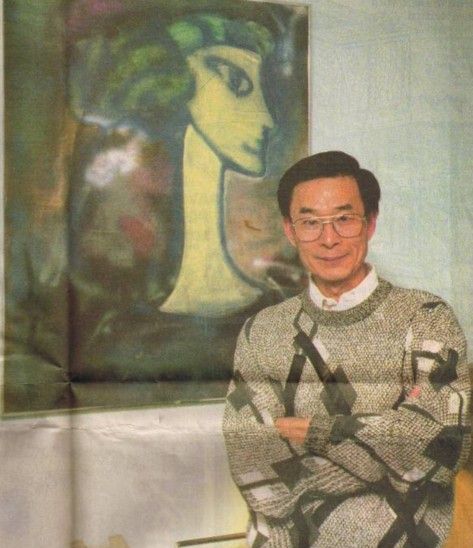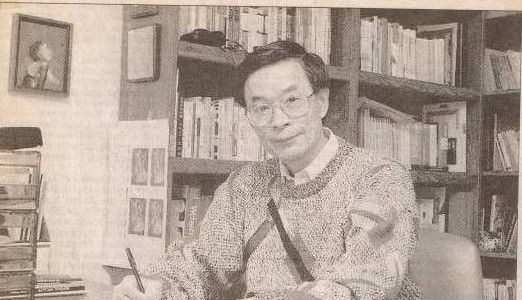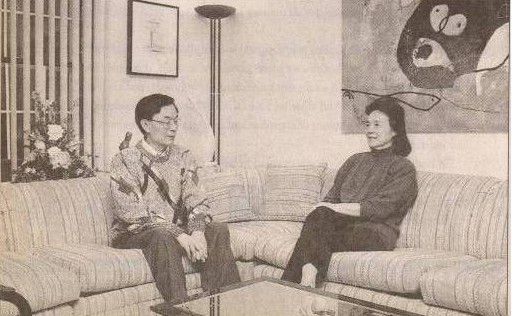倾听诗人非马的心声
|
爱思英语编者按:非马, 本名马为义, William Marr,1936年生于台湾台中市,在原籍广东潮阳度过童年。台北工专毕业,美国马开大学机械硕士,威斯康辛大学核工博士,曾在美国能源部属下的阿冈国家研究所从事能源研究工作多年。曾任美国伊利诺州诗人协会会长。著有诗集《在风城》《非马诗选》《非马集》《白马集》《非马短诗精选》 《非马的诗》 及 英文诗集 AUTUMN WINDOW 等十六种,散文集《凡心动了》及译著多种。作品被收入一百多种选集及教科书,并被译成十多种文字。主编《朦胧诗选》、《台湾现代诗四十家》及《台湾现代诗选》等多种。被美国评论家誉为芝加哥有史以来值得收藏的十位诗人之一。近年并从事绘画与雕塑,在芝加哥、北京等地及网络上举办了多次个展及合展。非马素以简洁纯朴的形式表达丰富深刻的内容著称。他的许多作品都充满了对人类及宇宙万物的悲悯情怀,强烈的生命感及隽永的哲思,常予读者以震撼,令人过目难忘。《非马艺术世界》是他自己营造的个人双语网站。现居芝加哥。非马专栏:http://www.engbus.cn/column/feima/ 'Actually, I'm not a great lover of poetry, but Bill's poems are immediately accessiblee. They have a certain feel and observation...' Albert Chilenskas, an Argonne colleague of Marr With William Marr's retirement from Argonne, he expects to have more time for his poetry as well as his painting. The work shown hanging in his home is on the cover of his new book. The voice of the poet William Marr, relatively unknown in this country for his verse, has a large following in his native China People are frequently amazed to learn that William Wei-Yi Marr of Downers Grove, a nuclear engineer who retired this month from Argonne National Laboratory, is an internationally know poet and translator. His most successful book, "In the Windy City," set in the Chicago area and published in Taiwan, has sold out three printings in Taiwan, China and Southeast Asia. Literature classes in Taiwan study his poetry. Marr's first nine books are written in Chinese, his native language. His 10th and latest book, titled "Autumn Window" (Arbor Hill Press, $8), is in English and is available at Anderson's Bookshops in Downers Grove, Naperville and Elmhurst, Borders in Naperville and Oak Brook, and Barnes & Noble in Oakbrook Terrace and Downers Grove. Marr arrived at Argonne in 1969 and began working with Philip Pizzica of Naperville, another nuclear engineer. They soon discovered their mutual interest in poetry. Pizzica was a boon to Marr's early efforts at translating Chinese poets into English. Pizzica said, "I can't speak Chinese, so my contribution was just a matter of adding the perspective of an English-speaking reader. We'd talk about usage and connotation and the music and cadence of word choices after Bill explained what each line said in the original. Translating is not a mechanical process. Capturing nuances of meaning and dealing with English grammar are difficult enough. Making it ring like poetry is far more difficult." Chicago poet Li-Young Lee, winner of a Guggenheim fellowship and the Lamont Poetry Selection of the Academy of American Poets for his second book, said, "I love Bill. Hi's one of the truly civilized people I know. He writes and paints. A renaissance guy. I met him in Chicago about 10 years ago when I first came here. Chinese-American artists and poets used to have parties in Chinatown or someone's home. We paint and write poetry all night. "Bill's poetry is of a certain school-there's a plainness, but there's also a twist in language and perception he's very good at," Lee said recently. "I think poetry is a sort of yoga for him. Keeps him sharp, humane, lively. He practices his art as a tonic for the pressures of modern life. And sometimes poets like him practice the art for something greater than self. Like a religion." Marr has translated some of Lee's work into Chinese. He also has translated Carl Sandburg, Emily Dickinson, Richard Wilbur, Conrad Aiken and many more into Chinese. Other poets have translated some of Marr's work into Japanese, Korean, Malaysian and Slavic. The Thinker Holding his chin thinking how to hold the chin and watch the computer do the thinking Although he has worked as a nuclear engineer, William Wei-Yi Marr of Downers Grove is also a poet, having written ten books, nine of them in Chinese. In fact, literature classes in Taiwan study his poetry. Albert Chilenskas of Hyde Park worked with Marr at Argonne on one of their current projects, electric cars. "We have a lot in common, professionally and socially," Chilenskas said. "I do a little painting, although not in the same class as Bill. But I don't write. Actually, I'm not a great lover of poetry, but Bill's poems are immediately accessible. They have a certain feel and observation, and I thought if someone like myself enjoys them, maybe others would, too. So I encouraged him to do a book in English." Chilenskas' encouragement was the sincerest kind. He offered to help finance publication costs. His favorite poem in the collection reminds him of his parents' plight in Lithuania. It's titled "Bird Cage": open the cage let the bird fly away and give the cage back its freedom The form is typical of Marr's style: Lean and pointed, letting line breaks serve as punctuation and accentuation of meaning. Verse has never been freer, yet strong discipline is at work. Marr was born in Canton, China, in 1936. His father took him to Taiwan, where he was on his own at age 13. His father had business interests in other parts of Asia. He supported his son's education, but there was little communication between them. No literature was taught at Marr's engineering college in Taiwan. Feeling the need for some, he decided to put out a mimeographed magazine. He was force to write most of it himself, including a few poems. English was taught in Taiwan schools, but Marr said the teachers usually learned it from books, and pronunciations were often incorrect. "My first year in college in the U.S. was very hard--trying to understand the instructors and take note," he said. Marr came to the U.S. in 1961 as a graduate engineering student. He received a master's degree at Marquette University in Milwaukee where he met and married Jane Liu. He received a Ph.D. in nuclear engineering from the University of Wisconsin, Madison. He was senior engineering analyst at Allis-Chalmers in Milwaukee before going to work at Argonne. Larry Turner of Naperville, an applied physicist at Argonne, sees nothing strange about the idea of scientist as poet. He's one himself. He met Marr in 1991 after an Argonne news quarterly ran an article about Turner's poetry. "I got a call from someone in the next building who saw the piece," Turner said. "It was Bill. He came over and introduced himself and brought some of his poems. I really liked them. I had gotten together a small poetry workshop in Naperville, and I invited him to attend. He did, and he's been coming ever since." Marr's wife, a chemist, works at Argonne in environmental research. "Autumn Window" is dedicated to her. Their two sons, Dennis and Alvin, are grown and now live in Buffalo Grove and Chicago, respectively. Dennis, who works for Baxter Health Care and writes instrumental jazz, said of his father's new book: "I was surprised. He's a very private man, never shows pain. He's always been the glue that held the family together. In these poems I see sides of him that give us all a greater understanding." Dennis recalled an article in a Chinese newspaper years ago, "a survey of the best 20th Century writers, according to the critics, my father ranked 13th. It makes me wish I could read Chinese. Someday I'm going to be able to. I want to read all his work. I'm so proud of him." Writing under the name Fei Ma in Chinese, Marr has won many awards for his poetry. He was also the editor of "Forty Modern Poets of Taiwan," "Modern Poetry in Taiwan" and the "Anthology of Contemporary Chinese Poetry." published in China, Hong Kong and Taiwan, respectively. Besides literary journals, his poems have appeared in more than 70 anthologies here and abroad. He is a consulting editor for New World, a poetry magazine in Los Angeles. Asian American News, a weekly community paper in Chicago, has featured his poetry in every issue for the last five years. In 1994, Marr was selected as one of the poets for Dial-A-Poem, Chicago! Dennis recorded his father's poem for the callers. From 1993 to 1995, Marr served as president of the Illinois State Poetry Society. Early this year he was inducted into the Chicago Poets Club. Marr still appreciates help with occasional problems in English idiom, but the members all say he gives much more than he receives. Constance Vogel, Chicago Poets Club president and member of ISPS, said: "Bill Marr is an asset to any group. He's so modest and quiet, but when he comments on a poem he offers something valuable, something you hadn't thought about." Marr says he probably wouldn't have written the new book if it hadn't been for Turner and his group's critiques and the Illinois State Poetry Society whose members boosted his confidence in his adopted language. For years Marr did not know the fate of his mother and younger brother in mainland China. In the early '70s his mother and brother were able to contact his father in Taiwan, who got in touch with him. Marr made arrangements to help them financially, and after three decades, he was able to visit them in 1980. "They suffered a lot in China," he said. His poem "Drinking Tea at a Family Reunion After Thirty Long Years of Separation" says more, although equally succinct: Down at one gulp how unbearable it would have been to taste drop by drop the cup of thirty bitter years You smile and say to me good tea should be sipped and savored Some of Marr's poetry, like "Necktie," is wry commentary: Before the mirror he carefully makes himself a tight knot to let the hand of civilization drag him on Some of it tweaks technology, as in "Midwest Floods, 1993:" Ground control to shuttle Columbia Backyard flooded return immediately With Marr's retirement, he expects to have more time for artistic pursuits. He studied oil painting and sculpture, and he had his first solo showing at Point Gallery in Westmont in 1994. Marr's admiration for Picasso is evident in some of his paintings, an example of which is on the cover of his new book, which also includes a poem about Picasso. Asked why he writes poetry, Marr said, "It's like having a dialogue with people, nature, even the past and future. Poetry enables me to understand other people's feelings and to express my own." Marr dispels any notion that poetry and science are not compatible. "Scientific training helps develop keen observation and thinking," he said. "I try to pay more attention to the essence rather than the superficial." "If there is an obligation to being a poet, I'd say it's the promotion of understanding and peace among people. Harmony in the family, in society, in the world. Coming from a family that was torn apart by the Japanese invasion, then by the communist revolution, I treasure family life dearly." In 1986 Marr again visited his mother and brother in China, this time taking his wife and sons. After this last reunion, Marr lost both parents and brother to illness. "In Memory of" (excerpt) On the moonless sky each star is a grain of sand in my shoes of memory The human spectrum visible in "Autumn Window" will make readers nod, smile and perhaps wipe an eye. Marr dedicated his latest book, "Autumn Window," to his wife, Jane. "If there is an obligation to being a poet, I'd say it's the promotion of understanding and peace among people," Marr said. Glenna Holloway is a poet and past president of the Illinois State Poetry Society. She wrote a foreword to "Autumn Window." |


 Although he has worked as a nuclear engineer, William Wei-Yi Marr of Downers Grove is also a poet, having written 10 books, nine of them in Chinese. In fact, literature classes in Taiwan study his poetry.
Although he has worked as a nuclear engineer, William Wei-Yi Marr of Downers Grove is also a poet, having written 10 books, nine of them in Chinese. In fact, literature classes in Taiwan study his poetry. 







